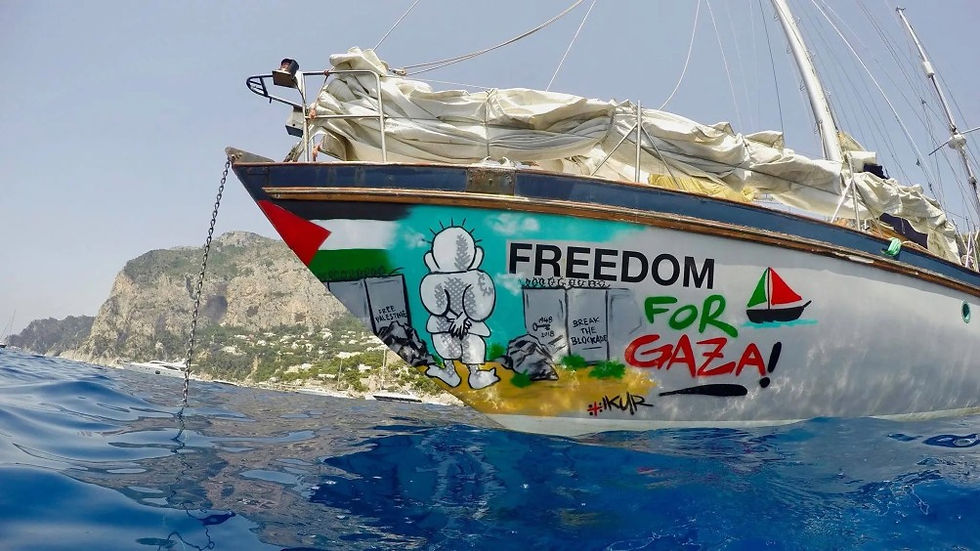The Global Sumud Flotilla, An Act of Resistance
- Andika

- Oct 18, 2025
- 6 min read
Oftentimes we fail to see how acts of resistance fail to make any difference in anything. The Global Sumud Flotilla (GSF) proved that wrong. In June 2025, a fleet of flotillas set sail toward war-torn Gaza carrying determined activists with the aim of providing humanitarian aid and challenging a decades-long blockade.
Since 2010, a series of flotilla projects, sought to bring humanitarian aid through boats, has been intercepted time and again by the Israeli military, which illustrates the ongoing blockade, risks faced by many activists, and the projection of aggression by the Israeli forces in suppressing these movements. What can be observed from these repeated efforts of resistance is the fact that the June 2025 Freedom Flotilla and GSF was not a new thing at all, and this initiative and act possesses historicity and voices that must be preserved, even in the face of an active policy that attempts to erase Palestinians and abolish liberation.

What Happened with Freedom Flotilla and the GSF?
From the most recent Freedom Flotilla, which was subsequently intercepted and raided by Israeli forces, came the formation of the mighty Global Sumud Flotilla. To importantly denote the aims of resisting the Israeli genocide against the Palestinian people, the name “Sumud” derived from Arabic meaning “Resistance” and given how in this flotilla there were 1,300 people that applied to be a part of the flotilla from all over the world, it earned its “Global” name. Comprising 42 civilian boats carrying some 500 activists from 44 countries, the “Global Sumud Flotilla” was, in essence, more appropriately phrased, a “Global Resistance Flotilla.”
This global facet that existed in the GSF was the exact reason why it became an international concern when Israeli forces intercepted, raided, and kidnapped nationals coming from these 44 countries. In kidnapping some Australian activists from some seized flotillas that were part of the GSF fleet, many reports were recounted by Amnesty International about the force and aggressiveness with which the Israeli forces responded in dealing with these activists. One prominent account was of Surya McKewan’s experience of being dealt with by Israeli forces; His arm was dislocated, his head slammed into the ground, and his passport was torn to pieces. Another account was of Juliet Lamont, who was blasted by a water cannon and forced to sit in an unventilated area for 7 hours while bound to a chair.
Other very prominent accounts of the aggressiveness of the Israeli force towards flotilla activists involved Greta Thunberg, the 22-year-old Swedish Climate Activist. There are reports from witnesses of other activists highlighting how Greta Thunberg was beaten by Israeli forces and humiliated by being forced to kiss the Israeli flag in her detention. These accounts of force and violence against activists whose only goal was to deliver aid, such as food, diapers, and other essentials, once again highlight the violent nature of Israeli forces and authority, and reinforce their image as an oppressive and violent regime. The legality of this conduct must be questioned as well.
What jurisdiction does Israel have in going against international law by jamming these flotillas’ communications, raiding them, and attacking them in Tunis while docked? On all accounts, it is difficult to deny that Israel’s actions reflect the behavior of an expansionist state that relies on force and repression. — Andika

Public Reaction
The Global Sumud Flotilla demonstrated resistance in multiple ways, both internationally and locally. While the flotilla sparked worldwide protests demanding the release of detained activists, it also emphasised the challenges Palestinians face in carrying out their everyday activities under blockade and artillery fire. Most notably, and closest as well, there were protests in Malaysia for the release of Malaysian nationals who contributed to the flotilla. Protests even reached from Paris to Barcelona, and as far as Buenos Aires. Calls for the release of these activists became the fuel for worldwide protests in support of Gaza and the Palestinian people, and a drive for these protesters to increase awareness of Gaza and the genocide of the Palestinian people.
With the most recent dates and figures, all 42 boats comprising the fleet were all intercepted by Israel between 1st-3rd October, and by the 6th of October, Greta Thunberg, along with 160 other activists, were deported from Israel to Greece accordingly to highlight the occurrence and importance of awareness regarding the genocide. Greta Thunberg noted that “The International System has failed us” in preventing Genocide from happening and in the provision of discussion between political agents. Circa 12th of October 2025, it is reported by the official Global Sumud Flotilla organisation that 462 activists were all freed, with 1 left remaining in captivity.
The result of the GSF was not only international, it was also domestic. Consequently, in conducting the GSF, the activists made an impact for the Palestinian people, as for the very first time in all the years of military strikes and shootings of vessels and sea, Palestinians in Gaza were able to safely conduct fishing and gain fish from the sea again in the course of the Israeli interception of the GSF. This is because in the course of intercepting these flotillas, the Israeli forces, more specifically the navy, were focused on the GSF because of the sheer number of flotillas that were approaching them. This illustrates the real, local impact of an international effort to combat an oppressive state.

Historicity of GSF and Coloniality
The question must be asked: Why did the June 2025 Freedom Flotilla and Global Sumud Flotilla only recently earn the awareness that it deserves, but not the 2010 Freedom Flotilla and the flotillas that subsequently stemmed from it? As I have mentioned in the Introduction of this article, the historicity of the Freedom Flotilla is a facet that needs to be discussed more because Israel is a colonial entity that, in its foundations, seeks to destroy the knowledge, traditions, and existence of the Palestinian people. What they seek is not a two-state solution; they seek total erasure.
This term “coloniality” is very important to be understood as it not only seals the fate of the many Palestinians in Gaza and the West Bank, but also influences YOU. — Andika
The fact that not many people are aware of the occurrence of the 2010 Freedom Flotillas is very telling of the kind of awareness and influence that news agencies have on the many consumers of media. Nine people were killed and 30 more were injured in said 2010 Freedom Flotilla, but why didn’t the world throw a fit into the upheaval that we have now?

Social Media and Resistance
That’s where Social Media plays its role. Social Media platforms such as Instagram, YouTube, Facebook, and Twitter did have a role in reporting news in 2010, but not to the extent that it has now. In our time, these platforms have evolved in grabbing our attention at every second of our lives. Our phones, whether showering, walking, or studying, have become such a profound facet of our lives that it has become hard for people, for students and children especially, to focus on the most menial of tasks. With the evolution of these platforms in developing short-form content, people have now created a culture around interacting with this short-form content: “brain-rotting.”
That being said, traditional news websites have become a kind of third source, while these short-form content that delivers news concisely and directly has become the second source of information. Because of its rapid production and efficiency of news-sharing, it is only natural that when activists such as Greta Thunberg step on a boat to take on a colonial power, the news would spread like wildfire, questions would start to be asked, awareness is planted in the minds of many. That’s today, but in 2010 that was nowhere to be found, and news agencies, no matter how pro-Palestinian or just they were in their reasoning for Palestinian liberation, became a source of disappointment in proliferating news on these resistance movements. The Global Sumud Flotilla and subsequent Freedom Flotillas has shown us that nowadays the concept of “resistance” isn’t just physically going out to the streets to protest, but also in our conscious effort in consuming the right products that exist within our political and economic systems.
Writer's Notes:
I take a lot of interest in discussing decolonial initiatives and efforts that resist and fight against the current colonial and extractive system, and so I thought that it would be really great to tackle the topic of the Global Sumud Flotilla. Having lived in the Middle East for a long 11 years now, I feel as though the thoughts and desires of the people in the Middle East in liberating their brothers and sisters in Palestine have been misplaced by the stereotypical image of Arabs that resulted from the equally tragic event of 9/11. I feel as though justice must be done in the perception of Palestinian liberation as I know that there are still people willing to take the easy way of sitting on the fence, when it is clear that the suffering of the Palestinian people deserve more than just that.
Writer's Biography:
Andika is currently a second year student in International Relations with French. Hailing from Indonesia, he likes to discuss and yap about a lot of things, but mainly about: culture, politics, and the human condition. He hopes that he can be a professor one day that is able to influence not only the youth but also politics. Outside of academics, he does love to draw and look for fashionable tips and pieces in malls and thrift shops. He can be too talkative, direct, and inquisitive, so please bear with him.



Comments